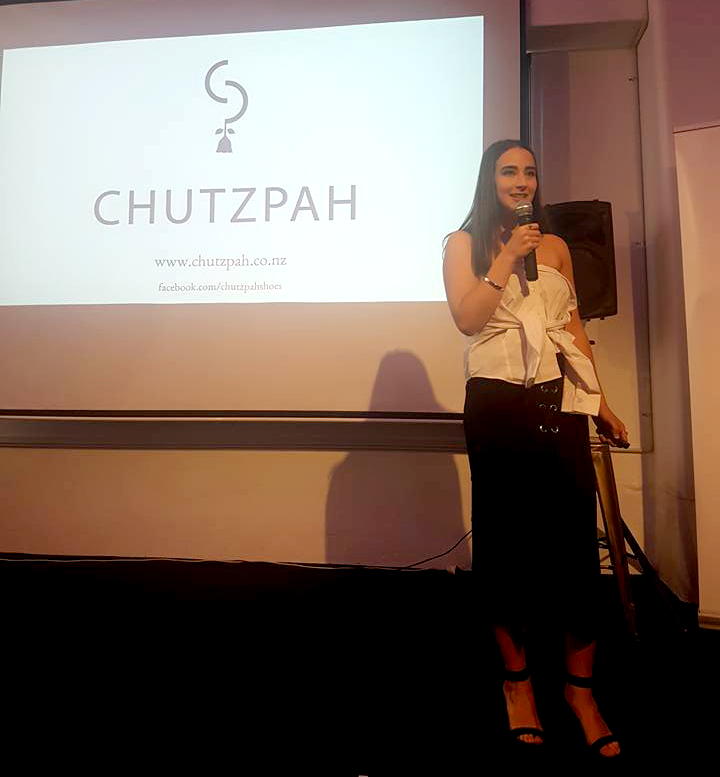Standing up to Sexism
Embassador & shoe designer Hannah Payne talks about how being forced to wear heels at work awakened her spirit to challenge sexism
When Embassador Hannah Payne started a job that made wearing heels while standing all day mandatory, she started to think about why women were required to wear shoes that left them in agony at the end of the day, when men would never be expected to put up with that.
It made her think about the different ways women are treated in the work place. So she decided to do something about it by designing comfortable shoes for women under the label Chutzpah, as part of Live The Dream.
We asked Hannah about her tips on combatting sexism and being a force.
Why did you decide that you wanted to design comfortable high heels for women?
I started working in a high-end retail store last year and after reading the dress code, I saw that it was mandatory to wear high heels to work every day. I realised there are hardly any fashionable, formal high heels with any sort of emphasis on comfort. I really started to think about the choices that women have, in terms of footwear for work.
After my first few days at work standing all day in 4-inch heels I was in so much pain it was crazy. Because I was in so much pain I found it much harder to focus on my role. I was standing all day so could not sit down to relieve the pain and kick off my shoes.
This made me think about the systemic sexism that allowed heel-wearing to be in a women’s contract, and why no one has challenged this yet. I was baffled that everyone was just 'going with the flow' on real issues like this and it opened my eyes to so many more cases of 'small' or casual sexism that so easily go under the radar and which nobody challenges.
I decided to try to do something about it and took the first chance I could.
What are the other challenges you see women face on the job in terms of being taken seriously, or respected as equal to that of a male employee?
A lot of people view women's workplace equality as simplified into a few areas- gender-based hiring, the wage gap and sexual harassment.
The truth is, these larger issues could not exist without the sexist culture that is perpetuated through smaller 'casual' sexist comments and acts. In a survey that I ran, I found that most of women at work were labeled as 'bossy' or 'pushy' instead of assertive or strong-willed like men would be. Overall, the survey showed disturbing results that overwhelmingly women have to work a lot harder to be respected and taken seriously at work, and a lot of the perception others have of them is dictated by how agreeable and unconfrontational they are.
I’ve seen a lot of sexism myself, like a woman being told that she was solely hired for looks - eye candy for the male customers. I've seen and heard so much sexism that we all just accept that it's hard to keep track.
What advice would you give to young women just starting out in the work force and facing these issues?
My biggest and most important piece of advice is to be vocal. Please don't be nervous of sounding bossy or out of place or pushy – you have the right to stand up for yourself and for anyone else that is receiving any sort of unfair treatment! If someone at work is saying something that offends you or sounds sexist – call them out. Try to stay level-headed even if all you want to do is get angry and shout at them.
If you feel you have a legal case for harassment or any other form of illegal behavior – record all comments that are said and any texts/actions/etc.
Don't be afraid to act on your feelings- it may save another employee from the same treatment. It's not a case of 'I can handle it'. Casual sexism is both a symptom and an enabler of more destructive forms of sexism. Be part of the solution and don't allow it to keep happening.
Is there anything else you would like to share with NZ's young women about owning the ground they are standing on or facing challenges in any area of their life? i.e something you have learned that could help someone get through a tough spot?
The biggest and most important value that I base all my decisions on is integrity- so the biggest advice I can give is to always consider each decision you make and how it impacts every person involved and the environment. Whether it is buying fair trade or vegan products to help the environment and workers in 3rd world countries or standing up to your boss to let him (or her) know that you won't stand for sexism.
You would be surprised at how much more positive you can be emotionally and mentally when you know that you are a positive impact on the world and you are changing it to be a better place!









